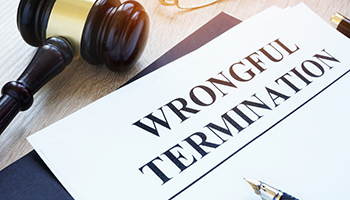Employee Rights
California Employment Attorneys
At Kokozian Law Firm, we help workers who have been wronged by their employers by skillfully litigating their employment law claims. Whether you suffered discrimination on the job based on your disability, pregnancy, medical condition, sexual orientation, race, or age, or you suffered a wrongful termination, sexual harassment, retaliation, were denied a medical leave of absence, or did not receive pay for all hours worked, we are here to help you.
Employment Law
At Kokozian Law Firm, our practice is focused on representing California workers. We do not represent employers, staffing agencies, labor organizations, firms, or companies. Our single-minded passion for helping California workers has enabled us to develop the skills necessary to litigate a wide variety of employment matters. We represent employees on a contingency fee basis, which means we do not charge you anything unless we win your case. Employment matters for which we represent California workers include disputes related to discrimination, wrongful termination, retaliation, leaves of absence, sexual harassment, the Americans with Disabilities Act (ADA), the Creating a Respectful and Open Workplace for Natural Hair Act, the Family Medical Leave Act, the California Family Rights Act and the Equal Pay Act. Our skilled, experienced, and compassionate employment attorneys can help workers assert their rights under any of these laws. For a more complete list of employment matters we handle on behalf of California Workers, please visit our Site Map.
The Fair Employment and Housing Act (FEHA)
At Kokozian Law Firm, we regularly represent workers for workplace-related discrimination claims. While there are several laws that prohibit workplace discrimination, none are more important to California workers than the Fair Employment and Housing Act, California Government Code sections 12900 – 12996 (FEHA). The FEHA is California’s primary anti-discrimination law. The FEHA applies to both private and public employers. The FEHA also applies to staffing agencies, employment agencies, and labor organizations.
The FEHA Prohibits Workplace Discrimination, Including Harassment
Workplace discrimination occurs when an employer treats a worker (or a particular group of workers) differently (especially in a less desirable way) from the way the employer treats other workers because of the targeted worker’s sex, race, or other protected personal characteristic.
Under the FEHA, it is unlawful for any employer of five or more employees (with the exception of certain religious organizations) to discriminate against an employee, when the discriminatory conduct is based on one or more of the personal characteristics for which the FEHA provides protection. Personal characteristics protected under the FEHA include age (40 years of age and older), ancestry, color, creed (religious beliefs), physical disability, mental disability, marital status, medical condition (e.g. cancer), national origin, race, sex, and sexual orientation.
Workplace harassment is a form of workplace discrimination. Workplace harassment occurs when an employer engages in behavior aimed at upsetting or annoying a worker because of the worker’s sex, race, or other protected personal characteristic.
Under the FEHA it is unlawful for any employer, even an employer of less than five employees, to harass an employee, when the harassing conduct is based on one or more of the personal characteristics for which the FEHA provides protection. While sexual harassment may be the most well-known form of harassment, unlawful workplace harassment is by no means limited to sexual harassment.
FEHA Prohibits All Types of Discriminatory Business and Employment Practices Constituting Workplace Discrimination
The FEHA applies to all business and employment practices. The FEHA outlaws a broad range of discriminatory business and employment practices. For example, discriminatory job advertisements and restrictions on the availability of job applications are unlawful. Discriminatory job applicant screening and hiring processes and word-of-mouth recruitment are unlawful. Discriminatory practices as to specific job assignments, shift assignments, transfers, promotions, layoffs, and recalls after a layoff are unlawful. Discriminatory practices as to compensation and other working conditions, including entitlement to retirement programs, vacation leave, sick leave, insurance, and access to overtime, training and apprenticeship programs, are unlawful. Reducing work hours or increasing surveillance on an employee for discriminatory reasons is unlawful. Excluding an employee from meetings and the flow of business information, physically isolating an employee, assigning burdensome or unnecessary jobs tasks, or imposing unwarranted obstacles to returning to work from a medical leave for discriminatory reasons are also unlawful. An undeserved negative performance review or coordinated campaign of hostility for discriminatory reasons is unlawful.
The FEHA Prohibits Retaliation Based on Claims of Discrimination or Harassment
Under the FEHA, it is unlawful for employers of five or more employees (with the exception of certain religious organizations) to retaliate against an employee (e.g. fire, demote, isolate, or discipline an employee) because:
- The employee complained (i.e. to a supervisor of the employer) of being subjected to workplace discrimination or harassment or of another employee having suffered workplace discrimination or harassment.
- The employee threatened to file a charge of discrimination under the FEHA.
- The employee requested an accommodation from the employer for a disability or religious belief.
- The employee sent a letter to a governmental agency (e.g. the California Civil Rights Department) complaining of discriminatory practices or harassment at work.
- The employee participated in a government proceeding regarding discrimination or harassment (e.g. a U.S. Equal Employment Opportunity Commission hearing or a deposition).
- The employee informed the employer of a policy or conduct which the employee believed to be discriminatory; or
- The employee refused to obey a discriminatory order or an order the employee reasonably and in good faith believed to be discriminatory (e.g. refusing to follow a supervisor’s instruction to fire a worker who informed the employer that she was pregnant, or to fire a worker who filed a good-faith discrimination lawsuit against the employer).
Wrongful Termination
As discussed in the preceding section, employers discriminate against workers through a variety of means. Workplace discrimination can be expressed by any act of the employer that negatively affects a worker’s ability to perform his or her job or restricts opportunities for advancement, promotion, or entitlement to job benefits. Workplace discrimination is sometimes expressed through subtle means, such as excluding a worker from certain emails sent to all other members of the worker’s department. Workplace discrimination can also be overt and severe, such as when a worker is fired from his or her job. When this happens, a worker has suffered a wrongful termination and is stripped of his or her livelihood and status as a productive member of society.
At-Will Employment
While a worker may have an expectation that he or she will continue working for an employer until retirement or another future date, ordinarily an employer is under no legal obligation to retain a worker for a particular length of time. In California, employment is presumed to be “at will” absent an employment contract between the worker and the employer for a specific duration of employment. What this means is that most employment in California is not guaranteed for any specified period of time.
Obligations of the Employee Upon Ending His or Her Employment
Generally, a worker can choose to end his or her employment at any time without penalty or legal or monetary consequence. While it is common practice for employees to give their employers two week advance notice that they are quitting a job, in keeping with the at-will employment doctrine, this is not a legal requirement.
Obligations of the Employer Upon Ending the Employment of an Employee
By the same token, an employer generally may end a worker’s employment at any time without penalty or legal or monetary consequence. However, an employer does have a few legal obligations upon firing a worker. Pursuant to California Unemployment Insurance Code section 1089, an employer must immediately notify an employee of any change in his or her relationship with the employer (e.g. that the employer is firing the worker). Failure to comply with this requirement could result in the employer being charged with a misdemeanor. In addition, pursuant to California Labor Code section 201, an employer must immediately pay a worker all wages owed upon terminating the worker. Exceptions to this rule apply to certain industries (e.g. oil drilling and motion picture production). As mentioned, generally, unless the parties previously agreed otherwise (usually through a written employment contract), neither the worker nor the employer is required to give advance notice prior to ending the employment relationship. An exception to this rule is a mass layoff or plant closing that meets certain criterion, in which event under the Worker Adjustment and Retraining Notification Act (WARN Act) the employer must provide 60-day advance notice to affected employees and specified government entities.
Exceptions to at-will Employment, Whereby Firing a Worker Constitutes Wrongful Termination
There was a time when an employer could fire a worker for almost any reason without penalty. Fortunately, over time, even though California has remained to this day an at-will employment state, the California Legislature and California Courts have placed certain restrictions on an employer’s right to terminate a worker. An employer can terminate a worker’s employment for any reason, except for an unlawful reason, at any time or for no reason at all without being subject to any legal consequences. When there is evidence a worker was fired for reasons other than because of business needs or a dissatisfaction with the worker’s services, an experienced employment attorney should evaluate the facts of the situation to determine whether a claim for wrongful termination would likely succeed.
The FEHA Prohibits Wrongful Termination
Under the Fair Employment and Housing Act, California Government Code sections 12900 – 12996 (FEHA), it is unlawful for a California employer to fire a worker due to a protected personal characteristic such as the worker’s color, race, religion, reproductive health decision making, ancestry, national origin, mental or physical disability, gender identity, gender expression, gender, marital status, age, sexual orientation, veteran or military status, childbirth, pregnancy, or medical conditions associated with pregnancy and/or childbirth. When an employer fires a worker due to a protected personal characteristic, this constitutes a wrongful termination for which the affected worker can seek damages.
While the FEHA applies to a broad range of workplace situations, an employer’s hiring practices, compensation practices, and even the selection of employees for training programs, the FEHA’s reach is not limitless. The FEHA does not protect workers from discrimination and wrongful termination who are nonresidents of California and who are employed outside California, even if the employer is based in California. The FEHA does not apply to workplace discrimination conducted outside the territorial boundaries of California.
Other Statutes That Prohibit Wrongful Termination
While every California worker should become familiar with the broad protections afforded under the FEHA, many other California laws protect the rights of workers. Several California laws other than the FEHA apply to claims for wrongful termination. These statutes apply to situations where the worker has been fired for reasons other than discrimination based on a protected personal characteristic. In the past, California workers were fired for a multitude of reasons (e.g. taking time off to enroll a child in school) that most people perceived as being patently unfair and morally wrong. The problem was, no law prohibited the employer from firing the worker for such reasons as taking time off to enroll a child in school or meet with the school principal concerning a disciplinary issue. Over time, the California legislature has addressed many of these situations, enacting statutes under the California Labor Code (as well as the Health and Safety Code and Unemployment Insurance Code) that prohibit an employer from terminating an employee under specific circumstances not covered by the FEHA. For example, if your employer fires you for taking time off from work to serve on a jury, your employer may be liable for wrongful termination. If your employer fires you for refusing to perform work that would violate an occupational safety or health standard, your employer may be liable for wrongful termination.
Wrongful Termination Due to a Physical Disability
Under both the FEHA and the federal Americans with Disabilities Act of 1990 (Title 42 of the United States Code, Section 12101 et seq.) it can be unlawful for your employer to terminate your employment because you are an individual with a physical disability. So long as you can perform the essential duties of your job either without any help from your employer or with a reasonable accommodation, your employer is prohibited from discriminating against you due to your physical disability.
An Example of Wrongful Termination Due to a Physical Disability
For Sake of Example Let Us Say You Were Well and Able-bodied When You Were First Hired by Your Employer. at Some Point After Your Employment Began You Were in a Serious Car Accident. You Take Time Off From Work to Recover From Your Injuries. After a Few Weeks, Your Doctor Releases You to Return to Work. You Now Have a Pronounced Limp Because of the Injuries You Sustained in the Accident. You Find it Difficult to Walk or Stand for Long Periods. Unfortunately, Your Doctor Has Indicated That This is Likely Permanent. Your Doctor Gives You a Note to Hand to Your Employer Indicating That You Cannot Stand or Walk More Than Twenty Percent of the Time While at Work. These Are Called Work Restrictions. You Give the Doctor’s Note With the Work Restrictions to Your Employer. Your Employer Promises to Accommodate Your Work Restrictions, Saying, “It’s No Problem, We’re Just Glad to Have You back.” Because of Your Injuries, You Cannot Work as Efficiently as You Did Before the Accident. You Ask Your Employer if Someone Can Take Over a Few of Your Job Duties. Your Employer Promises to Have Someone Help You Out. That Never Happens. Instead, Your Employer Writes You Up for Violating a Policy You Did Not Know Existed, for Something You Had Been Praised for Doing in the Past That Saves the Company Time and Money. Soon Thereafter, You Are Passed Over for the Promotion You Were Promised Before the Accident. the Following Week Your Boss Calls You Into Her Office and Says, “Sorry, but We’re Going in a Different direction.” Someone From Human Resources Hands You a Final Paycheck and Escorts You Out of the Building. This is an Example of How a Claim May Arise for Wrongful Termination Due to a Physical Disability. the Reason for the Termination—that the Employer Was Going in a Different Direction—is Likely a Sham Reason to Cover Up the Fact That You Were Terminated Due to a Physical Disability.
What Counts as a Physical Disability?
Under the FEHA, physical disability is broadly defined. Physical disabilities can include both actual and perceived disabilities. In the example above, the worker had an actual disability documented by a physician. As for perceived disabilities, when an employer through observation concludes that an employee has a disabling condition and discriminates against the employee on that basis, the employer can be held liable for discrimination even if the employee does not in fact have a disabling condition. It is sufficient that the employer believed the employee had a physical disability and discriminated against the employee under the mistaken belief that the employee suffered from a physical disability. Under the FEHA, a physical disability is a condition, disorder, disease, disfigurement, or loss that affects one or more of your body systems (including cardiovascular, immunological, neurological, or speech organs), or restricts a major life activity. Many different activities constitute a major life activity, including working and walking. Examples of physical disabilities and medical conditions afforded protection under the FEHA include disabling injuries to a limb, back conditions, severe migraines, diabetes, arthritis, asthma, lymphoma, scoliosis, brain seizures, cancer, and many other medical conditions that might cause you to miss work.
Wrongful Termination Due to a Mental Disability
The FEHA also prohibits employers covered by the FEHA (e.g. employers with five or more employees who are not exempt religious associations or corporations not organized for private profit) from discriminating against an employee, including wrongful termination, based on a mental disability. So long as you can perform the essential duties of your job either without any help from your employer despite the fact that you suffer from a mental disability, or with a reasonable accommodation, your employer is prohibited from discriminating against you due to your mental disability. An accommodation is considered reasonable and therefore the employer is obligated to provide the accommodation unless the act of providing the accommodation would create an undue hardship on the employer. If providing the accommodation requires significant difficulty or expense on the part of the employer, then the accommodation is not reasonable, and the employer is under no legal obligation to provide the accommodation to the employee with a mental disability. The more costly the accommodation, the greater likelihood that it will be considered to create an undue hardship for the employer. An accommodation considered to be an undue hardship for a smaller employer likely may not be considered to be an undue hardship for a larger employer.
To Summarize:
- If you can perform the essential duties of your job without accommodation even though you have mental disability, then it is unlawful for your employer to discriminate against you due to your mental disability.
- If, due to your mental disability, you cannot perform the essential duties of your job without accommodation, but you can perform the essential duties of your job with a reasonable accommodation, then it is unlawful for your employer not to provide you with the reasonable accommodation or otherwise discriminate against you due to your mental disability.
- If, due to your mental disability, you cannot perform the essential duties of your job even with a reasonable accommodation or without endangering the health or safety of yourself or others, then your employer can terminate your employment due to your mental disability.
What is a Mental Disability Under the FEHA?
A Mental Impairment Must Restrict a Major Life Activity to Constitute a Mental Disability Under the FEHA. for Example, if it Makes Achieving a Major Life Activity Challenging, Such as Working in a Noisy Workplace Environment, This is a Limitation on a Major Life Activity. Mild Conditions That Do Not Limit a Major Life Activity Are Not Mental Disabilities Under the FEHA. Mental Disabilities That Arise Most Often in Claims for Wrongful Termination Due to a Mental Disability Include Clinical Depression, Learning Disabilities Such as Dyslexia, Autism Spectrum Disorders, Post-traumatic Stress Disorder, Anxiety Disorders, and Obsessive Compulsive Disorder. a Common Point of Contention in Wrongful Termination Claims is Whether the Claimed Mental Condition in Fact Qualifies as a Mental Disability Under FEHA.
Failure to Accommodate a Disability
Under California law, it is illegal for an employer not to provide you, as an employee or a job applicant, a reasonable accommodation for a known mental or physical disability if the reasonable accommodation will enable you to perform the essential functions of the job. There is an exception to this rule. If the proposed accommodation would generate an undue hardship for the employer, then it is not a reasonable accommodation and the employer has no obligation to provide you the proposed accommodation. A determination as to whether the proposed accommodation would generate an undue hardship for the employer must be examined on a case-by-case basis. There is no bright-line rule on what constitutes an undue hardship.
It is also unlawful for your employer to discriminate against you or retaliate against you because you requested a reasonable accommodation under the FEHA or the federal Americans with Disabilities Act (ADA). It is unlawful for the employer to discriminate against you or retaliate against you because you requested an accommodation even if it is later determined that the requested accommodation would create an undue hardship for the employer and thus is not a reasonable accommodation. Our experienced employment lawyers can help you hold an employer accountable if you are discriminated or retaliated against for requesting an accommodation for your physical or mental disability. Accommodations in the workplace come in many different forms. They can include:
- modifications of job duties (such as assigning to a coworker the task of carrying the heavy trays you occasionally lift as part of your job).
- modifications of schedules (such as permitting you to work from 11 a.m. to 7:30 p.m. as opposed to your usual schedule of 9 a.m. to 5:30 p.m. so you can attend morning doctor appointments without missing work time).
- handicap accessibility (such as wheelchair ramps, or installing an ergonomic work station if you are affected by carpal tunnel syndrome).
- a job-protected leave of absence (such as an unpaid leave of absence of up to 12 weeks under the California Family Rights Act (CFRA) (California Government Code sections 12945.1, 12945.2, and 19702.3), or as a reasonable accommodation under the FEHA for an employee who does not qualify for CFRA leave to recover from an injury or undergo treatment).
Wrongful Termination or Discrimination at Work Due to Cancer
The FEHA prohibits covered employers from discriminating against an employee, including wrongfully terminating an employee, due to a diagnosis of cancer or a history or record of cancer. This is an important protection for a multitude of workers, as nearly half of all persons diagnosed with cancer are working age adults. If you find yourself in this situation, you may be asking yourself What are My Rights as an Employee With Cancer at Work? For more information related to your rights, please access our cancer-related webpages, including:
- Your Rights for Work Accommodations as an Employee With Cancer
- Your Rights as an Employee Who Has Survived Cancer
- Your Rights as an Employee Working With Cancer
- Your Rights for Medical Leave After a Cancer Diagnosis
Did You Lose Your Job After Being Diagnosed With Cancer? if You Were Fired Due to Colon Cancer, Fired Due to Breast Cancer, Fired Due to Prostate Cancer, or if You Were Otherwise Fired From Work After Cancer Diagnosis, it is Important That You contact an Experienced Employment Attorney, Such as the Experienced Employment Attorneys at Kokozian Law Firm, to Help You Determine Whether You Have a Viable Claim for Wrongful Termination Due to Cancer.
Sexual Harassment
Both Title VII of the Civil Rights Act of 1964 (Title 42 of the United States Code section 2000e, et seq.) and the FEHA prohibit sexual harassment in the workplace. Sexual harassment is harassment based on sex or gender, including gender stereotypes. It can include:
- verbal sexual harassment (such as suggestive sexual comments or inappropriate comments about a person’s body).
- sexual jokes (such as sexually explicit or crude jokes, stories, or commentary).
- touching (such as touching and physical assault motivated by sexual desire, as well as touching motivated by a desire to gain control over or demean a person based on the person’s sex).
- persistent leering (such as repeatedly staring at a person’s crotch or breasts).
- visual displays of sexual materials (such as sending inappropriate images or sexually graphic images).
There are two kinds of sexual harassment under the law: hostile work environment harassment and quid pro quo harassment.
Hostile Work Environment Sexual Harassment
Hostile work environment sexual harassment occurs when conduct directed toward a person is so severe or pervasive that it generates a work situation that is both objectively and subjectively hostile or offensive. A frequent point of contention in hostile work environment sexual harassment cases is whether the conduct complained of does in fact constitute sexual harassment. The conduct complained of must not only be inappropriate but must be severe or pervasive enough to create a work environment that is hostile, intimidating, offensive, oppressive, or abusive from both an (i) objective standpoint and from the (ii) subjective perspective of the targeted worker. Depending on the conduct involved, an experienced employment attorney may need to carefully examine the entirety of the person’s work situation and circumstances to pursue a successful hostile work environment sexual harassment claim. For example, a single obviously intentional touching of a person’s genital area would likely constitute actionable sexual harassment in of itself. In contrast, an occasional pat on the shoulder would likely constitute sexual harassment only if coupled with other workplace behaviors or conduct, such as a work culture where the sharing of sexual jokes in common areas is tolerated.
Quid Pro Quo Sexual Harassment
Quid pro quo sexual harassment happens when an employer conditions employment or employment benefits on submission to sexual conduct. Quid pro quo sexual harassment commonly occurs when a supervisor seeks sexual favors from a worker in exchange for a work benefit such as continued employment, better pay or hours, or promotion. Quid pro quo sexual harassment also occurs when a supervisor seeks sexual favors from a worker in exchange for the worker not receiving some sort of detriment, such as termination, a pay cut, a demotion, less favorable hours or working location, or a poor performance review.
The sex of the individuals involved is not a factor in determining the validity of a sexual harassment claim. The harasser can be of either sex or the victim can be of either sex.
Wrongful Termination Due to Pregnancy
Under the California Pregnancy Disability Leave Law, which is a provision of the FEHA, if you are rendered disabled so that you physically cannot work because of childbirth, pregnancy, or pregnancy associated conditions, you can take a leave of absence for a reasonable period that is up to four months before coming back to work. You must provide your employer with at least 30 days of notice that you will be going out on California pregnancy disability leave unless you are not able to give 30 days of advance notice because of a medical emergency or other change in your medical condition. Your employer may demand that you provide medical certification from your doctor indicating why a leave of absence is necessary and the estimated length of leave required. You are not required to provide your employer with your precise medical diagnosis or diagnoses.
Other Eligibility Requirements for California Pregnancy Disability Leave
You must work for a California employer with five or more employees (fulltime or parttime) to be entitled to California pregnancy disability leave. There are no other eligibility requirements. New and parttime employees and long-term and fulltime employees alike are eligible for California pregnancy disability leave.
When Can California Pregnancy Disability Leave Be Taken?
The four months of California pregnancy disability leave need not be taken all at once. California pregnancy disability leave can be taken both before and after birth. Medical conditions that are covered include those that are medically recognized mental or physical conditions associated with giving birth or being pregnant. Severe morning sickness is an example of a medically recognized physical condition associated with pregnancy. You may also be entitled to 12 workweeks of leave for a birth and other reasons under the California Family Rights Act or the federal Family and Medical Leave Act, depending on the size of your employer and how long and the number of hours you have worked for the employer.
Your Employer’s Obligations Under the California Pregnancy Disability Leave Law
It is unlawful for your employer to terminate your employment because you are pregnant or because you have taken or requested California pregnancy disability leave. Upon returning from California pregnancy disability leave, your employer should reinstate you to the same job position you held before going out on leave. Under certain circumstances, you may be reinstated to a position that is comparable to the job position you held before going out on leave.
Our employment lawyers can help workers understand their rights in this area of the law. The California Pregnancy Disability Leave Law, like other portions of the FEHA, is enforced by the California Civil Rights Department and employment law firms such as Kokozian Law Firm.
Wrongful Termination Due to Complaints of Sexual Harassment
Sexual harassment can be committed by coworkers, supervisors, managers, customers, or others in the workplace. You should not be terminated from your job because you complained of workplace sexual harassment. You should not be discriminated against or otherwise penalized for making a complaint of sexual harassment to your Human Resources Department or to a supervisor. You should not be discriminated against for filing a charge with the federal Equal Employment Opportunity Commission, filing a complaint with the California Civil Rights Department, or suing in court for sexual harassment, as these are protected activities under Title VII and the FEHA. If you are terminated for complaining of sexual harassment, you may be able to recover lost wages and benefits, as well as emotional damages. If your employer’s conduct was particularly malicious, punitive damages may be available. Before making a complaint of sexual harassment, you should review your employment handbook for any grievance procedure and act accordingly. Do not remain silent. If you are subjected to sexual harassment, report it.
Under the FEHA, it is an unlawful employment practice for an employer to harass an employee because of sex or to fail to take reasonable steps to prevent sexual harassment from occurring in the workplace. (California Government Code section 12940, subdivision (j)). Under the FEHA, it is also an unlawful employment practice for an employer to discriminate against an employee because he or she opposed a practice forbidden under the FEHA. (California Government Code section 12940, subdivision (h)). So long as the employee reasonably believed she or he was subjected to sexual harassment and complained to her or his employer about the harassment, this qualifies as opposing sexual harassment and is considered a protected activity under the FEHA. Thus, if an employer fires you for complaining of sexual harassment, this is an unlawful employment practice that constitutes wrongful termination.
Retaliation for Complaints of Harassment
In California, employers employ workers at will. Generally, an employer can terminate you for any reason, and you can quit for any reason. There are exceptions, as an employer may not terminate you for an unlawful reason. For example, an employer is not allowed to terminate you or subject you to another adverse employment action such as a suspension or a reduction in pay for engaging in an activity protected by a law. This is called retaliation, and a number of statutes prohibit retaliation, including the FEHA and California Labor Code sections 98.6, 230, 230.1, 230.2, 230.3, 230.4, 230.5, 230.7, 230.8, 232, 232.5, 233, 234, 244, 246.5, 1102.5, 1197.5, 6310, and 6311. It is a protected activity under the FEHA to complain of harassment in good faith, or to oppose (e.g. complain of or report) employer practices the employee reasonably believes violate the FEHA. To prove a claim of retaliation based on a complaint of harassment, an employment lawyer needs to show that you complained of harassment, you were subjected to an adverse employment action (e.g. termination or demotion), and there is a causal link between your harassment complaint and the employer’s retaliatory acts.
Leaves of Absence
You may be entitled to take a leave of absence from work for various reasons under California or federal law, depending on the size of your employer. Reasons for which you may be able to take a leave of absence in California include pregnancy, disability, taking care of family, military service, jury duty, voting, drug or alcohol rehabilitation, volunteer firefighting, or serving as emergency rescue personnel.
Leaves of Absence Under the California Family Rights Act (CFRA)
While based on the federal Family and Medical Leave Act, the CFRA applies to more workers and more situations than the federal statute.
Under the CFRA, so long as:
- your employer has at least five employees
- you have worked for your employer for more than 12 months, and
- you have worked at least 1,250 hours for your employer in the 12 months prior to going out on a leave of absence
you can get up to 12 workweeks of leave in a 12-month period for:
- caring for a newborn
- the placement of a foster child or new adoptee with you, or
- caregiving for a spouse, domestic partner, child, grandparent, parent, parent-in-law, sibling, another family member, or an induvial with whom you have a family-like relationship who has a serious health condition, or for your own serious health condition.
Your employer may require you to provide a written certification from a physician stating the reason for the leave and the probable duration of the medical condition giving rise to the need for the leave of absence. The leave of absence may be taken over one continuous period or over two or more separate periods.
Leaves of Absence as an Accommodation Under the FEHA
If you have not worked for your employer for more than 12 months, or if you have not worked at least 1,250 hours for your employer in the 12 months prior to going out on a leave of absence, you may still be entitled to a leave of absence for a qualifying reason as an accommodation under the FEHA so long as the requested leave of absence does not create an undue hardship for your employer. As with other accommodations under the FEHA, a determination as to whether the proposed accommodation of a leave of absence due to a medical condition creates an undue hardship must be determined on a case-by-case basis.
Employee Compensation
Disputes over employee compensation often involve wage and hour or overtime claims. The chief federal wage and hour law is the Fair Labor Standards Act of 1938, 29 United States Code Section 201, et seq. (FLSA). California employers must also abide by the California Labor Code, which in many instances provides greater benefits to workers than federal law. For example, the minimum wage in California is higher than it is under federal law, so employers must abide by the higher California minimum wage. Unlike under federal law, California law requires employers to pay their non-exempt employees at an overtime rate for all hours worked in excess of eight hours in a workday, regardless of whether the employee worked in excess of 40 hours in a week. In California, non-exempt employees must be paid overtime in an amount of one and one-half times their regular pay rate for all hours worked beyond eight hours, up to 12 hours in a workday, and for hours worked beyond 40 hours in a workweek. Non-exempt employees must be paid overtime for the first eight hours worked on the seventh consecutive workday in a workweek. Non-exempt employees must be paid at double their regular rate for hours worked beyond 12 hours in a workday and beyond eight hours on the seventh consecutive day of work. Unlike the FLSA, under California law employers must provide non-exempt employees with rest breaks and meal breaks.
Contact a Knowledgeable Employment Attorney
If your employer has harmed you by violating laws that protect your rights in the workplace, or if you suspect a potential violation, you should consult the Kokozian Law Firm. Our attorneys can help you assess your options and develop a strategic plan to assert your rights. We represent employees throughout California. Call us at 323-857-5900 or contact us via our online form.
Client Reviews
Bruce Kokozian is the best lawyer in town! From the beginning, he was straightforward and honest with me about my case. He was sympathetic of my situation and fought aggressively for my rights. I understood all the details of the case, and was supported by the extremely nice and helpful...






Contact Us
- 1 Take Action Now
- 2 You Have Rights
- 3 No Fees Unless We Win for You
Fill out the contact form or call us at 323-857-5900 or 800-786-6562 to schedule your Free Consultation.








